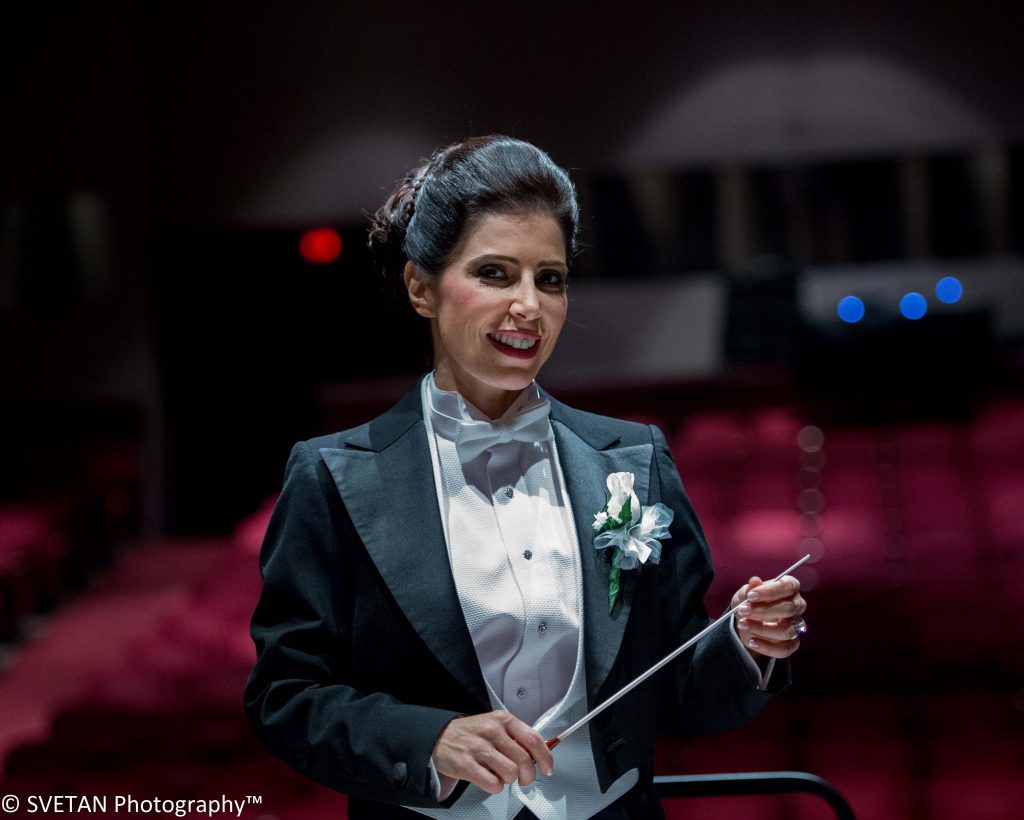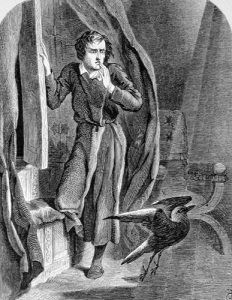The greatness of every high school band program begins with an educator, who sparks a love for music like no other, and yet holds himself (or herself) to be strong, powerful, and assertive. An educator’s ability to ignite a fire in a student’s soul is the reason why music can be so life-changing for students. Music can be an escape for many who might be from broken homes or from chaotic backgrounds, and often a music educator can guide a troubled student through those difficult times. Simply put, educators can change lives.
In a high school ensemble, the educator is the conductor: the one who conducts the program to greatness. He (or she) conducts each beat, packing it with a punch that can be understood by every member of the ensemble. A conductor holds the power to mold an ensemble into greatness. And greatness is determined by the hard work, passion, persistence, and talent of the ensemble, and, according to some, greatness is determined by the gender of the conductor: “The essence of the conductor’s profession is strength. The essence of a woman is weakness.”1
In music education, winning is seen as a man’s game. Men dominate head band director positions, often leaving women in the shadows of tremendous band programs. With little to no opportunity to shine, women tend to hide their immense talents and passions for music from the public eye. But with the ability to spark an interest in music, women should be at the forefront of music education. And yet, they are hidden behind a stereotype of weakness. They are deemed weak because they seem incapable, weak because they seem unworthy, and weak because they are women. Women aren’t weak, and yet they are perceived to be. Women aren’t unable, or unworthy, and yet they are perceived to be. Women are hidden behind the baton simply because they are women.2

Female representation in high school band education is an issue that is often silenced in the music community. Instead of sparking a conversation, many choose to leave the issue festering on the back-burner. As a result, more and more women are leaving their profession as music educators, in order to escape discrimination and underrepresentation. In fact, a study spanning the years 1948 to 2008, done at the Midwest Clinic and Concert, concluded that 264 high school band educators were male, whereas only 15 high school band educators were female.3 Even after all of the years of gains for women in other areas, women educators are still struggling to gain teaching positions in this male-dominated profession. In the realm of high school band education, women are vastly underrepresented due to their lack of mentorship, their experiences with sexism, and societal expectations of them.
Mentors play a crucial role in the upbringing of a student musician. Students in music education look up to their mentors as a guides, as they discover their passions and figure out the world around them. The problem surrounding high school band education is that there are simply not enough female mentors. In a 2007 study, researchers found that many school districts tend to pair student teachers with mentors of the same gender. Because women are underrepresented in the band education world, many student teachers are paired with male mentors.4 Being paired with a male mentor may provide female students with a false sense of what the music education field is about. Instead of viewing the profession through the lens of someone like themselves, as women, female student teachers are seeing high school band education as a career that is dominated by men. This creates a struggle for female student teachers in the music education field by failing to show where women’s purpose in music is. A music student teacher may feel that she simply does not fit into the profession because she struggles to see herself represented in it. As a result, the pool for female band director candidates, never large to begin with, has continued to decline in recent years.5 In fact, the percentage of female band educators has decreased 12 percent in the past 14 years, showing a downward trend of underrepresentation.6 With such low numbers of female band directors, female students who love music are simply unable to visualize themselves as female band directors, simply because they’ve never seen one before. As a result, female teenagers and college students opt-out of pursuing music education. With such continuing underrepresentation, the trend for women in high school band education will continue to decline if change doesn’t take place. It is crucial that more female representation is found in music education in order to give female student teachers more access to female mentors. Instead of being paired with male mentors, who they may not connect with, female student teachers should be paired with female mentors, who can be role models for them. Therefore, it should be at the forefront of music education to promote women candidates for band programs, because they are more than capable of holding their batons just as high, if not higher, than men.

In music education, women endure discrimination from their male counterparts during student-teaching, the application process, and even when holding the position itself. Several scholars, including Amy Bolvin and Sarah H. Fischer-Croneis, emphasize the intense discrimination that high school female band directors encounter during their time as an educator. Scholar Amy Bolvin reveals that intimidation, verbal abuse, and sexual harassment are all factors that play into women often leaving their positions as band directors or changing grade levels to escape such abuse. As a matter of fact, many female band directors are often apprehensive about going to music conventions in case they encounter inappropriate behavior.7 Furthermore, female band educators struggle to gain respect in the band community due to stereotypes of women. In fact, scholar Sarah Fischer-Croneis reveals that many female band educators have to portray a false persona in order to be accepted in the profession. Only by feigning male attributes of being masculine, intimidating, and tenacious, are women able to be taken seriously as adequate band directors by their male peers.8 If a female music educator fails to appear masculine, then students, parents, and staff will perceive them as uneducated and weak.9
Such stereotypical portrayals of women are prominent in music education, as female band directors continue to experience discrimination and sexism in their positions. Bolvin emphasizes that female band educators working in high schools are experiencing discrimination throughout the application, interview, and hiring process. As a matter of fact, women tend to be hired into band programs that are not well established, or are small and/or failing. This means that women are often placed in situations where they have to build a band program from the ground up.10 Being placed in such disadvantaged positions, women are often found overwhelmed and often fearful of what their futures hold as music educators. With women being constantly hidden behind men, they are incapable of expressing their talents and ability to provide their students with strong musical educations. Therefore, it is crucial that future generations are educated about the importance of gender representation. Instead of portraying to students that women are incapable of leading band programs, women should be viewed as powerful and passionate. It takes the change of mentality by male music educators, as well as students and parents, in order to reveal the hidden talents of high school female band directors.

The battle to balance motherhood and music education is one that female educators struggle to fight. With such a chaotic work schedule, many women tend to struggle with balancing their music education job with their family. The lack of time is one aspect that many women fear when they become mothers, especially in the music education profession. Women often worry that they are not providing their students with enough resources for help and guidance outside of school hours because they need to be attentive to their families.11 Because high school band requires a large devotion of time outside the school day, specifically for football games and competitions during the evenings and weekends, many female music educators who have children feel emotional distress and guilt about not having time for their family or friends. The emotional distress that these female educators feel is a result of pressures from students, staff, parents, and other programs, to uphold a strong and effective band program.12 The pressure placed on female band directors to uphold a high standard of excellence as both mothers and as music educators creates a toxic environment for these women. Furthermore, women who pursue high school band education often have to decide whether to maintain activities outside of work, or work at a large high school band program. In fact, some women view large, suburban, high school band programs as deal-breakers, meaning that they would refuse to work a job that demands such large time commitments, such as that of a high school band program.13 The battle to find balance between motherhood and music education leads these talented female educators to feel drained and worn-out. Therefore, it is worth noting that mothers, specifically mothers who are in the music education field, should remind themselves that it is okay to rely on the supportive people around them, and it is okay to take time away from the profession.14 Mothers who depend on daycare, family, friends, or their spouses for help with their children aren’t weak, but strong and courageous.15 In order for women to feel represented in such a male dominated profession, it is crucial that women understand that they are capable of both being a mother and a music educator.
Winning in high school band education shouldn’t be just a man’s game. Female band directors shouldn’t be hidden behind the baton. Instead, female music educators should be at the forefront of the high school band education movement, signifying the power of music on human life.
The ignition of a flame that spark’s a student’s passion for music is what drives many women to pursue music education. The lack of mentorship, ongoing sexism, and societal standards hide the fact that women are capable, more than ever, to lead extraordinary high school band programs. With a baton in hand, women are strong, powerful, and assertive. The essence of a director is strength. The essence of a female band director is greatness.
I would like to thank several individuals who helped to bring my article to life. First, I would like to thank Mrs. Amanda Marino-Stevenson, the Director of Bands at Churchill High School, for providing me with a female perspective into the realm of high school band education, and for being an inspiration to many aspiring high school female band directors. Second, I would like to thank Dr. Duesterhoeft and Kelsey Sanchez for their knowledge and advice as I approached the research and project proposal stages of the writing process. Third, I would like to thank Dr. Whitener for the beneficial revisions on my writing that helped to advance my article, and for providing me with this opportunity to share my passion of music with the world. Lastly, I would like to thank my parents for their endless love and support as I tackled a topic that many fail to recognize exists. Through the help and guidance of these individuals, I have created an article that exemplifies the importance of female empowerment in music education.
- Anastasia Tsioulcas, “What is Classical Music’s Women Problem,” October 9, 2013, NPR, https://www.npr.org/sections/deceptivecadence/2013/10/09/230751348/what-is-classical-musics-women-problem. ↵
- Sarah H. Fischer-Croneis, “Career Intentions and Experiences of Pre- and In-Service Female Band Teachers,” Journal of Research in Music Education 64, no.2, (2016), 196. ↵
- Linda A. Hartley and Deborah A. Sheldon, “What Color Is Your Baton, Girl? Gender and Ethnicity in Band Conducting,” Bulletin of the Council for Research in Music Education 1, no. 192 (2012): 7. ↵
- J.N. Jacobs, “A qualitative study of first-year high school band directors and their mentors,” Doctoral dissertation, Available from ProQuest Dissertations and Theses database, no.3271149. ↵
- Linda A. Hartley and Deborah A. Sheldon, “What Color Is Your Baton, Girl? Gender and Ethnicity in Band Conducting,” Bulletin of the Council for Research in Music Education 1, no. 192 (2012): 40. ↵
- Amy J. Bolvin, “Breaking the Silence: The Phenomenology of the Female High School Band Director,” Update: Applications of Research in Music Education 38, no.1, (2019): 1. ↵
- Amy J. Bolvin, “Breaking the Silence: The Phenomenology of the Female High School Band Director,” Update: Applications of Research in Music Education 38, no.1, (2019): 1. ↵
- Sarah H. Fischer-Croneis, “Career Intentions and Experiences of Pre- and In-Service Female Band Teachers,” Journal of Research in Music Education 64, no.2, (2016), 188. ↵
- Sarah H. Fischer-Croneis, “Career Intentions and Experiences of Pre- and In-Service Female Band Teachers,” Journal of Research in Music Education 64, no.2, (2016), 190-192. ↵
- Amy J. Bolvin, “Breaking the Silence: The Phenomenology of the Female High School Band Director,” Update: Applications of Research in Music Education 38, no.1, (2019): 1. ↵
- Kate R. Fitzpatrick, “Motherhood and the High School Band Director: A Case Study,” Bulletin of the Council for Research in Music Education 1, no.196 (2013): 15-21. ↵
- Ryan D. Shaw, “The Work-Life Balance of Competitive Marching Band Teachers: A Multiple Case Study,” Bulletin of the Council for Research in Music Education, no. 200 (2014): 69. ↵
- Sarah H. Fischer-Croneis, “Career Intentions and Experiences of Pre- and In-Service Female Band Teachers,” Journal of Research in Music Education 64, no. 2, (2016), 185. ↵
- Ryan D. Shaw, “The Work-Life Balance of Competitive Marching Band Teachers: A Multiple Case Study,” Bulletin of the Council for Research in Music Education, no. 200 (2014): 69. ↵
- Jessica L. Terban, Strategies Used by Women High School Band Directors to Meet the Challenge of Balancing Career and Family (Ohio: Bowling Green State University, 2011), 1-2. ↵




34 comments
Victor Rodriguez
Wow, what a great and inspiring article. I am glad to see that woman are fighting every day to gain justice and more equality. It is truly devastating to see that women continue to be misrepresented and suppressed in many jobs that are out there. We need to do a better job at bring social justice into our society. As a former band student, all of my band teacher were always women. I can say they were all great teachers and I learned so much from the.
Andrew Gallegos
This article was very very well written and really went in debt with there topic. How gender discrimination is a big thing how women are being discriminated. It’s sad how women aren’t needing respected and getting the same resources as men.
Samson Pullattu
I would never have thought that gender discrimination would reach as far into fields as musical education. Anyone representing a minority in a field dominated by a majority is extremely important and Lebel is an example of this. People like Lebel pave pathways for others when it is regarded that they cannot pursue fields like musical education. Women should not be any less capable of conducting a band and this article does a great job highlighting Lebel’s role as a trailblazer.
Eric Grant
This is a captivating article. I was not aware that female representation in high school band education was an issue that proves your point that it is often silenced. The author does a good job of raising awareness of the importance of gender representation because female directors/instructors may have different impacts on male and female students. Great article!
Ricky Moreno
I really liked this article because it brings light to a subject that doesn’t get enough attention. Music and music education should definitely be available for anyone and they should be treated equally and fairly – man or woman. We should encourage all people to pursue music is they have the passion for it. In my opinion, music is an area of study and creativity where any sort of discrimination or bias should be dropped immediately. Music is music. No matter who is behind the baton or playing the instrument. Women are just as capable as men are at understanding and appreciating music. Great article Savannah
Erin Vento
This was a really amazing article! I know when I was in a band, we had about 5 band directors and all of them were men even though more than half of us in the high school band were girls. I’m really glad that you wrote this article because I agree that stereotypes hold back opportunities, praise, and advancements for women when their profession is artistic or passionate in some way.
Donte Joseph
I am super appreciative that I was able to find this well written article because I had never even thought about the potential for men to be favored in the world of band. I used to be in band in middle school, and while there were women, they did not have as big roles as the men did. Like I mentioned, it is important that this article was written because the only way to start addressing an issue I to recognize that there is a problem and this does just that.
Jakob Trevino
I really loved this article. I was unaware that band conductors were at one point discriminating against women. I believe that women are capable of handling anything that comes their way, and we see that in this article!
Aleea Costilla
This was a very well written article that displayed an issue of representation of musical teaching. I had never thought of possible gender discrimination in this field and that is why I think this article has such significance. It shows that women are misrepresented in all types of fields and the faults of that fact. This was overall an interesting read and I could definitely see the passion for the topic by the author.
Kendall Guajardo
I never thought this topic would even be so important as it was revealed in this article. I really enjoyed reading it and I cannot believe I never noticed the lack of female music educators compared to their male counterparts. It is so important to have representation in whichever career field someone wishes to be in. It helps anybody in any profession smoothly integrate into a career without the fear of imposter syndrome. There is definitely gender roles still present in society that boxes women and men into masculine and feminine roles that fit whichever job they pursue. I especially liked how in this article you pointed out she can not only be a mother but also have a great career. Women shouldn’t have to choose between motherhood and being successful because both are important to self-identity.